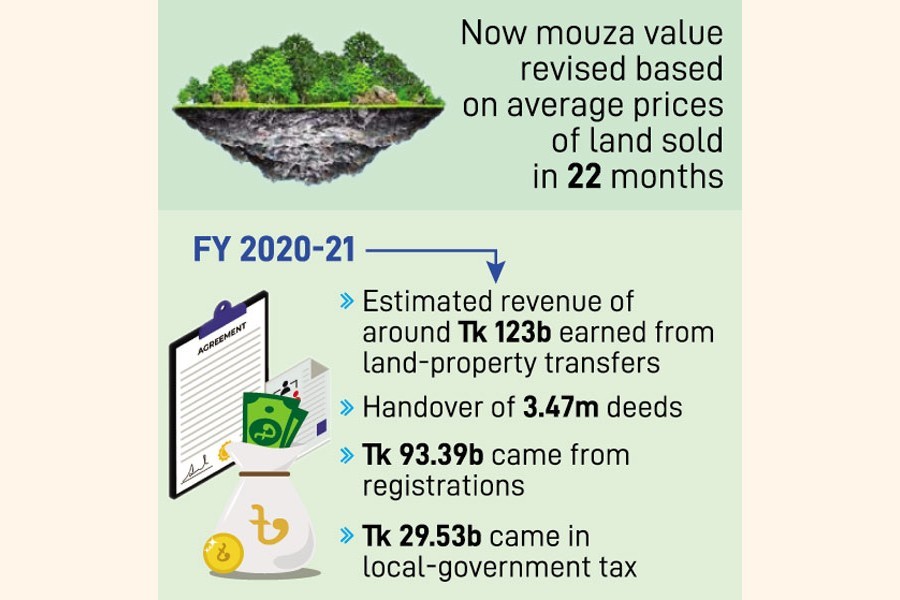Untaxed money makes the most while the exchequer loses huge revenue as a major government move to introduce cluster-based market value revision of land stalls, officials say.
The halt also leaves people in long wait of getting the benefits of the land-value-rationalisation initiative.
They say the minimum market price of mouza has not got an update since 2018, depriving the exchequer of receiving a good volume of revenue from land-property transfers.
Officials engaged in the sale-buy affairs of land blame the Covid-19 pandemic and lack of coordination among the agencies concerned for the stagnation in value revision through the clustering of land.
Based on a proposal, they say, the ministry of law initiated the process of replacing the traditional practice of mouza-centric price revision as each mouza has different types of land like low-lying and agricultural lands, roads, bazar and school. So, fixing a same rate for different categories of land is not logical and rational.
According to the minimum property market value-fixation guidelines 2010, the revision is done through calculating the average price of the land sold in a mouza in ten months (from January to October) when the periodic value adjustment was done in each year.
But it was changed from 2016 when the ministry decided to make the revision every two years on grounds that not a good number of land-transfer deeds was recorded a year.
Since then, the state-run Directorate of Registration under the Ministry of Law revised the mouza value after calculating average prices of land sold in a particular mouza in 22 months (from January to next year's October).
When contacted, Inspector-General of Registration (IGR) Shahidul Alam Jhinuk said they planned to introduce scientific way of value revision of land, like clustering of areas, in a mouza.
He said the number of land-transfer is expected to be increasing once the new revision model is implemented. "But the Covid-19 pandemic halted progress on the move."
Former president of Bangladesh Registration Service Association (BRSA) Dipak Kumar Sarker made the proposal of the cluster-based land-value revision.
Talking to the FE, Mr Sarker said he proposed the reform in 2018 as the same value for different types of land is not logical and rational at all.
"My proposal was to make a cluster of land depending on the location in a mouza and fix rates accordingly," he adds.
Giving an example, he says, the Bounia Mouza in the capital covers Uttara, Gulshan and Badda areas. "If we make rates of land same for these areas, will it be justified? Certainly not," he questions and answers in a rhetorical mode over the anachronism.
There will be a rate for lands in and around the road while the rates will be different in the agriculture, bazaar, school-college and low-lying areas, says Sarker, now district registrar of Khulna.
A high-powered committee was formed to deal with the critical task, giving a timeline of two years, with suggestions of inclusion of other key agencies like LGED and the department of land records and surveys, he mentions.
But the government had halted the move for two years since 2020, taking the adverse impact of coronavirus in livelihood into consideration.
"So, the land value remained unchanged since 2018," he adds.
Seeking anonymity, an official at the land ministry says the Anti-Corruption Commission few years ago had suggested the cabinet division to make the revision in a scientific way to prevent the scope of black money by using the faulty value-revision mechanism.
"A person can whiten huge volume of undisclosed money by buying a small land in Gulshan because he/she can legally invest huge money through only showing the minimum rate. It needs to be ended," he says.
Expressing frustration over the halt, he says the lack of coordination among the agencies concerned also slowed down the process because it is a critical task.
"The government lost huge volume of revenue over the last couple of years because of no progress in the move. If the revision was done in time, the rate would increase by some margin and it would increase the revenue," he adds.
In the financial year (FY) 2020-2021, estimated revenue of around Tk 123 billion was earned from land-property transfers, according to the statistics with the state-run Directorate of Registration.
The revenue was earned through handover of 3.47 million deeds that accounted for 82 per cent of government's previous fiscal's non-NBR tax-revenue target at Tk 150 billion.
Of the revenue, Tk 93.39 billion came from registration purposes while the remaining Tk 29.53 billion came in the form of local-government tax.
In the previous fiscal year, 2019-2020, the revenue figure was Tk 78.48 billion earned through handover of 2.55 million deeds across the country.


